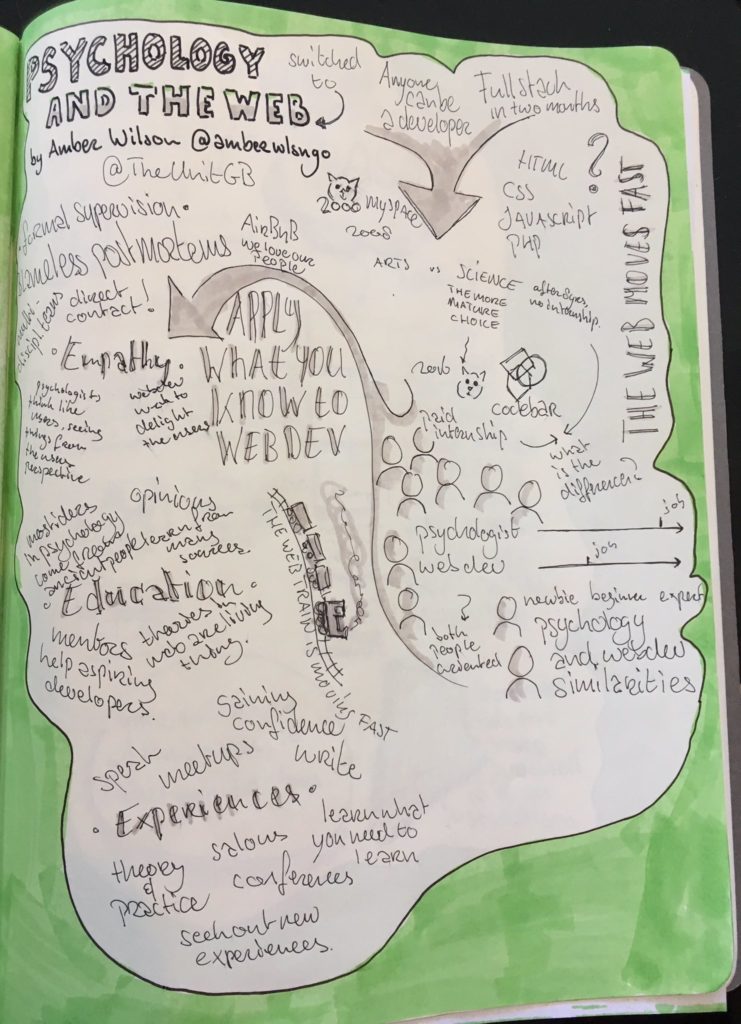Amber Wilson worked in the field of Psychology for many years and is now a budding Web developer at a design agency in Brighton. New to Web development, she is continually eager to improve her skills.
She has found that the skills and experiences she picked up studying and working within Psychology have guided her as a developer – sometimes in surprising ways, always in useful ways, and in some ways she has yet to discover.
She is excited to bring along her unique perspective on Web development through the eyes of a discipline she knows so well. She’ll talk to us about how folk that work on the Web can be aware of other disciplines that surround us, embrace their lessons, and harness these to build both a stronger Web and stronger bonds with each other.

Because…
We wanted to introduce Amber as a new speaker and have her explain her path from a Psychology student to a Web Developer. It still doesn’t quite feel like people doing “Web Development” come from a single line of educational training. Many people come from a design background, others from computer science, some are self-taught and have no formal training. There are even apprenticeship style training for working on the Web.
Amber came to the Web with a background in Psychology. With her knowledge and experience we wanted to have her explain how she feels we can do differently on the Web both as a team and towards our customers.
Psychology ➞ Web
Psychology takes years of education, placement and work experience before you can amass enough professional knowledge to truly due your job in a way that is beneficial to your patients.
Amber shows us lots of advertisements about learning to code and become a Web Developer. It ranges from years down to as little as two months. Why is it that some professions are so extremely rigorous with decades of research, opinions and experiments compared to the Web which can be learnt in just 8 weeks!
Somehow, you have to question the type of education you get in such a short amount of time. The Web is new and things are certainly moving fast. It is hard for the educational institutions to keep-up. In well established fields you can cite all that older research, but with the Web there seems to be a new javascript framework every week! That’s no excuse for taking any shortcuts when learning. Just because new technologies keep appearing, there are always some steadfast rules that underly all disciplines, including the Web.
There are parallels between working on the Web and psychology, by means of how we treat our customers. The empathy while diagnosing someone, the little delights interacting with them and listening go very far in your relationship in psychology. The same can be applied to the Web and your customers.
After interactions with external customers, we all have to deal internally with our teams. Web development is a multi-disciplinary environment with people from all sorts of backgrounds, skillsets and education working together to create products. Having a bad team member can be really draining and demotivating.
Working through all the relationships when dealing with psychology or the Web, you deal with customers, then the team and finally with yourself. In Psychology, there are good methods via tutors, apprenticeships and mentions where you can openly discuss the problems, get feedback and improve. Web developers are slowly getting there. Some companies have 1:1 meetings with management, but there are still gaps where mentorship could be the answer.
In psychology your are encouraged to seek out new experience. Learning from a huge range of topics is what feedback into your working knowledge and improves the field. It is designed so that you not only learn how to do the best work possible, but also for you to learn how to do your work. Everyone is going to have their own methodology, their own workflows and ways to approach problems. Without seeking new opinions and experiences, you can never grow. Learning plugs gaps in knowledge, and it allows you to gain confidence in your work. This is applicable to all fields.
We are humans designing for humans. Psychology helps those interpersonal skills to grow and when we put our customers, teammates and ourselves in the forefront, everyone benefits.
You can view all the video recordings and subscribe to the Material podcast on the Material Archive site.